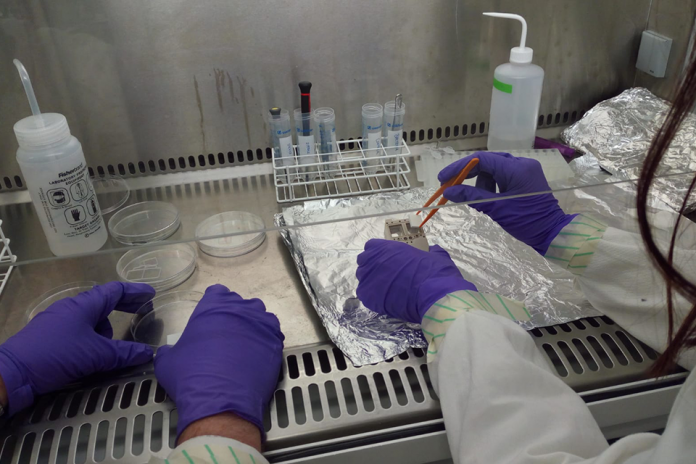Experiments on the International Space Station have shown that the process of “biomining” will work in microgravity; a discovery that could help the first space settlers gather the minerals they need to build a long-term presence beyond Earth.
The BioAsteroid experiment will take up match-box sized containers carrying asteroid rock, that will then be used to grow bacteria and fungi in an incubator for three weeks to investigate how gravity affects interaction between the microbes and rock in reduced gravity. Scientists will investigate how the microbes extract materials from rocks in space.
On Earth, microbes are used in some mining as an environmentally friendly way to access metals. They digest the rock and what is left behind are the metals that miners need.
If successful, this method would support efforts to explore the Moon and Mars, allowing humans to extract building materials, water or rocket fuel. Experimenting on the International Space Station (ISS) allows scientists to conduct unique investigations on the effects of microbes on asteroidal material in conditions that can’t be replicated on Earth.
Libby Jackson, Human Exploration Programme Manager at the UK Space Agency, said:
If we want to keeping exploring space and pushing the boundaries of what is possible, then we will need to make or find the essential elements required to support life.
Through our membership of the European Space Agency, UK scientists are able to take advantage of the unique scientific facilities available on the ISS and are at the forefront of efforts to recreate the foundations of life on Earth.
The new Bioreactor Express programme – which this experiment forms part of – is going to change the way we are able use this unique laboratory, opening up new opportunities for UK scientists and organisations to undertake science in space.
Scientists at the University of Edinburgh and Kayser Space, based at the Harwell space cluster in Oxfordshire, have collaborated on the project – the first European experiment to be fast-tracked through the Bioreactor Express programme, which is dedicated to biological, biotechnological and biochemistry experiments.
Prof. Charles Cockell, University of Edinburgh, said:
To sustain humans permanently beyond Earth we need to get access to useful materials. This experiment advances our ability to do that. It will also yield new fundamental insights into processes that are useful here on Earth, such as biomining and how microbes form biofilms that foul our pipes and industrial plants.
David Zolesi, Kayser Space Managing Director, added:
BioAsteroid confirms how much added value there can be in a commercial access to space and Kayser’s high level of expertise in carrying out biology experiments onboard the ISS. Going from signing the contract to launch in less than 18 months was only possible by exploiting the ISS on a commercial basis.
UK Government Minister for Scotland, Iain Stewart, said:
It’s fantastic scientists at the University of Edinburgh have worked on this monumental UK-led project.
We are living during a very exciting time for the space industry. Continued UK Government investment into the space sector will cement the UK as a global leader in space.
Last week, the Chancellor committed £14.6bn in funding for R&D in the Spending Review, which means investment in Scotland’s world-leading universities will continue to grow.
The experiment is due to launch to the ISS on the SpX-21, a Commercial Resupply Service mission contracted by NASA and flown by SpaceX using a Cargo Dragon 2.
The UK Space Agency funds the Bioreactor Express programme through its £374 million per year contribution to the European Space Agency (ESA). This membership enables the UK to collaborate with space agencies across the world on projects like the International Space Station.
Early next year we will see the first significant UK industrial contribution to the ISS. The ColKa communications terminal, built by MDA UK, will be installed by astronauts on a spacewalk in January.
This terminal will significantly upgrade the communications abilities in the Columbus module, where many of the UK science experiments take place as it will enable experiment data to be ‘beamed’ down to Earth.







